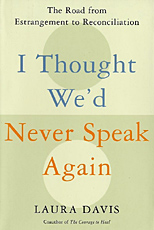Laura Davis, who was the co-author with Ellen Bass on The Courage to Heal about women who had been sexually abused, has interviewed over 100 men and women on the well-traveled road from estrangement to reconciliation. She found a constellation of inner qualities conducive to this healing journey: autonomy, discernment, courage, determination, honesty, compassion, humility, and accountability.
The case histories here include everyday estrangements such as friends who stopped speaking over a misunderstanding at the movies, siblings who fought over a will, children who made peace with parents they hadn't spoken to in years, all the way to victims of drunk drivers confronting the people whose actions turned their lives upside down, children of holocaust survivors meeting with children of Nazis, and Palestinian teenagers learning to get along with Israeli kids.
Davis again and again makes it clear how important communication skills are in the reconciliation process, especially when the parties are still smarting from wounds, anger, and a keen sense of betrayal. As one woman states: "Being connected is more important than being right." This is why embittered siblings and children and parents can reach out for each other to overcome the past.
Essentially this psychological work salutes the inner heart work that must be done to bring compassion to the fore. Davis quotes Nisargadatta Maharaj, a Jnana yoga master: "The mind creates the abyss and the heart crosses it." Only this step can turn enemies into allies.
The author wisely concludes that reconciliation stories are always works-in-progress. The range of case histories in this volume makes it suitable for a large crosscut of readers. With the increasing phenomenon of individuals dividing the world into "us" and "them," this psychological exploration of the healing powers of reconciliation couldn't be more timely.
